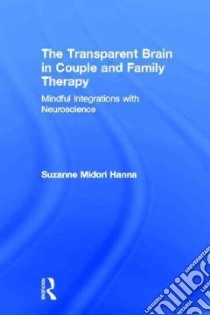The Transparent Brain in Couple and Family Therapy - 9780415662253
Un libro in lingua di Hanna Suzanne Midori edito da Routledge, 2013
- € 164.60
- Il prezzo è variabile in funzione del cambio della valuta d’origine
Why should family therapists care about brain research? Are there invisible connections between the breakdown of our relationships and the breakdown of our cells? To answer these questions, author Suzanne Hanna paints pictures of ancient principles coming together with contemporary research as a context for why basic concepts of neuroscience are relevant to couple and family therapy. She illustrates the reciprocal nature of the body and relationships in a book that simplifies and demystifies brain science for therapists. Using the latest findings from affective and cognitive neuroscience, she highlights 6 brain-friendly family therapy approaches and introduces the concept of biological empathy. This analysis enables practitioners to harness the power of mindfulness toward brain development and interpersonal healing. Client-friendly language allows busy therapists to educate without jargon. Applications of family therapy begin with the self of the therapist and advance through the interpersonal layers of attachment, pair-bonding, and community. Chapters include topics on:
• Whole body awareness
• A narrative approach to neuroanatomy and physiology
• 5 basic principles of neuroscience
• Basics of trauma treatment
• Male/female brain differences in couples therapy
• The ancient concept of tribe and a community frontal lobe
Each chapter summarizes with principles and guidelines for clinicians. Numerous illustrations make the brain transparent, while surveys, worksheets, and tables make therapeutic process transparent. The last chapter illustrates concepts and interventions through a full-length case story and applies addiction treatment as a case study for program development. The Transparent Brain includes case examples from all walks of life, highlighting heroic acts of survival. Clinicians can use 5 basic principles of neuroscience to bring relief more quickly, for more people from more diverse backgrounds. It is a revolutionary read and a must-have reference for any mental health professional.
Informazioni bibliografiche
- Titolo del Libro in lingua: The Transparent Brain in Couple and Family Therapy
- Sottotitolo: Mindful Integrations With Neuroscience
- Lingua: English
- Autore: Hanna Suzanne Midori
- Editore: Routledge
- Collana: Routledge (Hardcover)
- Data di Pubblicazione: 03 Settembre '13
- Genere: PSYCHOLOGY
- Argomenti : Couples therapy Family psychotherapy Couples Psychology
- Pagine: 317
- Dimensioni mm: 229 x 151 x 0
- EAN-13: 9780415662253


